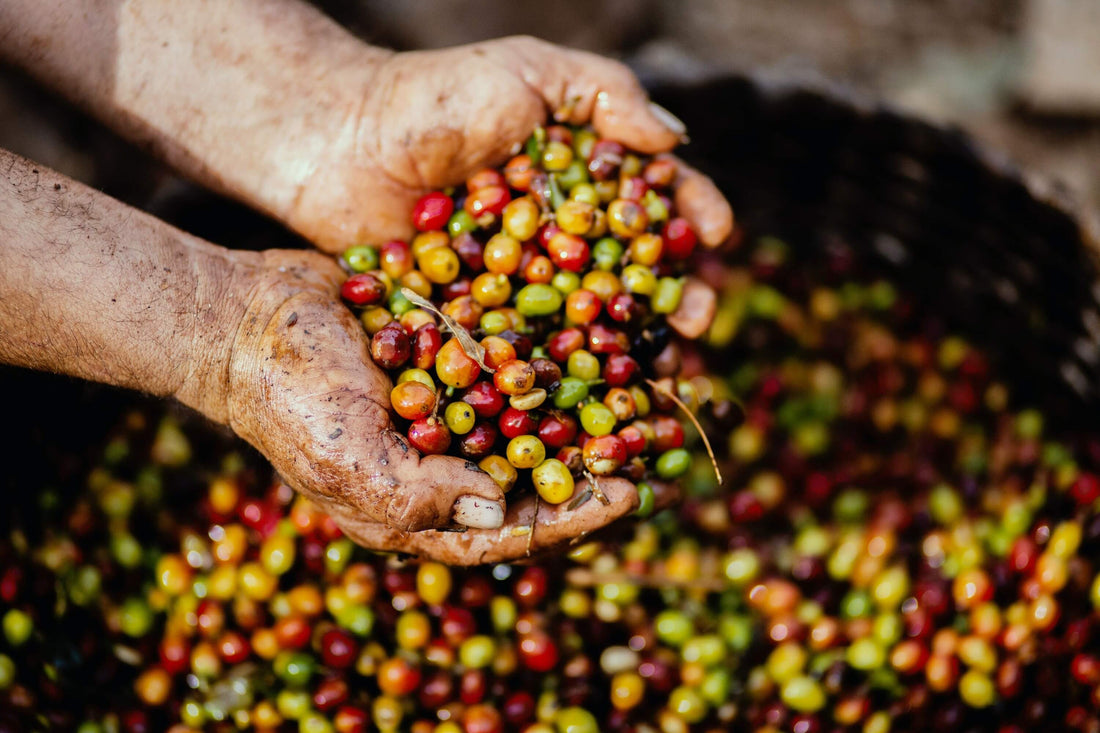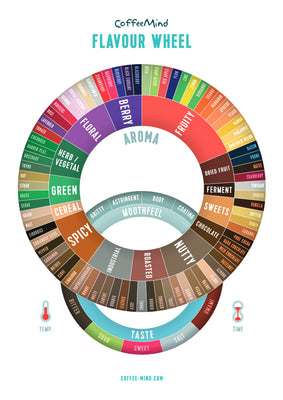
Nutrients in Coffee
tai attitude9 min read
We all love our coffee for different reasons. Interestingly, for some, they drink it for its health benefits. The question most people want to know is: Is coffee a healthy drink?
In this article, let’s put all the other wonderful aspects of coffee aside and focus on the nutritional aspect of coffee. Particularly, we look at the evidence from the studies on coffee to see what we can learn.
As everyone's health is different, this article is merely meant to provide an understanding of the nutrients in coffee. We hope you may use this understanding to decide for yourself whether coffee is healthy for you. Alright, let's find out.
|
Macro and micronutrients |
|
Caffeine is a stimulant |
|
Phytonutrients |
Macro and micronutrients
A cup of black coffee (240 ml) has roughly 0.3g of protein, 0.05g of fat, and 0.18g of carbohydrates. The macronutrients of all three contribute to very low calories at approximately 2.4 kcal, which is negligible for the human body.
Metabolically speaking, drinking a cup of coffee generates no energy. However, when coffee is added with milk, cream, sugar, or other flavourings, it contributes calories.
Although coffee has near-zero calories by itself, it does have some other essential key micronutrients in it, including 118 mg of potassium, 7.2 mg of magnesium, 7.1 mg of phosphorus, 0.1 mg of manganese, 4.7 mcg of folate, 6.2 mg of choline, and 4.8 mg of sodium.
Overall, coffee has very little macro- and micronutritional value. It is near impossible to get the daily amount of nutrients required by just drinking coffee.
But wait a minute—if coffee has so little nutritional value, then why do we feel so good after drinking it? The good feeling is indeed real, and it is caused by two other things in the coffee, namely caffeine and polyphenols.
Caffeine is a stimulant
Caffeine is not an essential nutrient for the human body, as our body can function perfectly well without it. Rather, caffeine is classified as a stimulant.
Caffeine is a naturally occurring compound in the coffee plant. Caffeine may also be found in other plant sources such as guarana, yerba maté, cacao beans, and tea.
The coffee plant naturally develops caffeine as a self-protection mechanism to ensure its survival. Caffeine is a poison to smaller organisms but turns out to be a stimulant to humans.
Caffeine is poisonous to small organisms such as insects, which die when a small amount of caffeine is ingested. For larger organisms, such as birds, when ingested, they will feel the ill-effects of caffeine and die if ingested in higher amounts.
For humans, who are much larger in comparison, it would take a large dose of 10,000 mg (10 g) of caffeine for it to be lethal to us. A cup of coffee (240 ml) has a range of 65–120 mg of caffeine, meaning one would have to drink 83 cups in succession to be in danger; hence, in this regard, for most people, consuming moderate amounts of caffeine poses no real health risk.
With 300 mg as the suggested daily limit, having 1 or 2 cups of coffee a day is fine. Although caffeine is not suitable for children or pregnant women, speak with your doctor if you have concerns about your daily caffeine intake.
Next, let's see how caffeine works in our system.
Caffeine is a central nervous system stimulant for the brain and other organs. It acts by reversibly blocking adenosine from binding to the adenosine receptor, which causes drowsiness.
Adenosine will gradually bind to adenosine receptors throughout the day.
When caffeine is present, it temporarily takes the spot of adenosine.
When caffeine is consumed, caffeine itself binds to the adenosine receptor, hindering adenosine. This results in our staying awake, our hearts beating faster, our blood pressure rising, our liver releasing sugar into the bloodstream for extra energy, our muscles contracting, improved cognitive performance, an elevated mood, etc.
Generally speaking, when all of this happens, we feel good.
The stimulating effect of caffeine will last temporarily until it is eventually removed from our system.
Caffeine's stimulating effect is felt daily by many, as it is not just present in coffee, tea, and chocolate; it is used in the pharmaceutical industry as well. Caffeine, in its pure, extracted form, is a bitter, white, crystalline powder. It is used as a pain reliever, and it is the most widely used drug in the world today. An approximate 100–130 mg of caffeine is added to drugs such as ibuprofen or paracetamol as a safe and effective dose.
Furthermore, caffeine is also added to soft drinks, energy drinks, certain ice creams, certain chewing gums, etc. to contribute a subtle bitter taste and stimulating effects.
Side effects of caffeine
Because caffeine is a stimulant, consuming too much (exceeding 300 mg) may have side effects. Just know that the side effects of caffeine are minimal for most people, but they could be severe for some. Let’s understand what these are.
1. Insomnia. Because caffeine resembles adenosine in shape. The presence of caffeine binds to the adenosine receptor, hindering adenosine. Though when this happens during the night, when we need to rest, it is bad. This will disrupt our sleep, which in turn will affect our next day.
2. Being overstimulated by caffeine may cause fatigue, irritability, anxiety, and a mood crash. When one develops the habit of over relying on caffeine, the brain simply develops more and more adenosine receptors for it. Overstimulation also causes the adrenal glands to release too much adrenaline. All of these result in an urge to drink more and more caffeine in order to feel energised.
3. Caffeine is a diuretic. Consuming too much may cause nutrient depletion of water-soluble vitamins and minerals, like vitamin C, B vitamins, and electrolytes, in our system. Caffeine may also interfere with the nutrient absorption of vitamins and minerals in our gut, including calcium, iron, magnesium, vitamin D, vitamin C, and B vitamins.
For the reasons mentioned above, if you are aiming for a healthy lifestyle in order to get the stimulating benefits of caffeine without the side effects, then please keep the following in mind:
- The best time to consume coffee is in the morning.
- Keep it to no more than 2 cups a day.
- Not consuming coffee during a meal or right after a meal.
Phytonutrients
Phytonutrients are naturally occurring compounds produced by plants as part of their immune systems to stay healthy. Plants use their phytonutrients to protect themselves from insect attacks and radiation from UV rays.
In coffee plants, the most abundant phytonutrient produced is called polyphenols. Polyphenols can also be found in many other plants. Most of the vegetables and fruits we eat have polyphenols.
When polyphenols are consumed by humans, they act as antioxidants and anti-inflammatory agents.
Polyphenols (antioxidants) work by neutralising excessive free radicals that would otherwise damage our cells and increase our risk for chronic illnesses like cancer, diabetes, heart disease, Alzheimer's, Parkinson's disease, etc.
Free radicals are highly reactive oxygen molecules, which are a natural by-product produced by our own body’s normal cell activities and external factors like radiation, air pollution, smoking, and chemical exposure.
Contrary to popular belief, our body not only produces free radicals, but actually uses them to help fight off various viruses and pathogens. Because free radicals are useful, our body will not completely eliminate them.
However, when free radicals accumulate excessively, they can cause oxidative stress, which wreaks havoc on all of our cells and, in turn, damages our health in the long run.
To keep free radicals in check, we need antioxidants. This is where vegetables, fruit, and our favourite coffee come in. Because polyphenols act as antioxidants when consumed. Frankly, our body will always need all the help it can get.

Antioxidants, without losing their own stability, are able to donate an electron to the highly unstable free radical, which in turn neutralises the free radical, therefore preserving a healthy cell.
High inflammation is one common factor linked to all the chronic illnesses mentioned above. By consistently having polyphenols (anti-inflammatory) in the diet, we may also keep our body's inflammation in check, thereby reducing the risks associated with it.
Regularly consuming polyphenols has also been shown by research to boost gut health, heart health, brain health, lower blood sugar levels, prevent blood clots, slow ageing, and more.
When polyphenol is obtained from foods that we eat or drink, it has virtually no side effects and only health benefits.
Coffee happens to have the highest amount of polyphenols of any beverage out there, followed by green tea. In other words, coffee is simply a great source of polyphenols. It’s so easy to get it with just 1 or 2 cups a day.
Polyphenols are technically fibres (prebiotics)
Polyphenols feed the microbiome in our gut. Therefore, increasing the population of good bacteria will promote the health of our gut. Moreover, the antioxidant properties of polyphenols also lower gut inflammation.
Most foods that we eat are slightly acidic, and coffee is no exception. The pH of coffee is weakly acidic at approximately 5. To put it in perspective, Coca-Cola is at pH 2.5, orange juice is at pH 3.5, apple juice is at pH 3.5, green kale juice is at pH 6, and milk is at pH 6.5.
An average person’s gut gastric acid has a pH range of 1-3 (acidic).
Overall, consuming coffee by itself is proven to be healthy for the gut, provided the gut is not damaged in the first place.
For those who have gut health issues, coffee might not be suitable for them. Just know that any gut health issue did not originate from drinking coffee, but coffee could worsen it. If you have concerns about this, have a talk with your doctor.
The types of polyphenols in coffee
Polyphenols in coffee consist of chlorogenic acid, cinnamic acid, ferulic acid, caffeic acid, quinic acid, hydroxycinnamic acid, melanoidin and more. All of these act as antioxidants and anti-inflammatory agents. Furthermore, each has additional health benefits of its own.
The most abundant polyphenol in coffee is chlorogenic acid, which comprises approximately 70–90% of the total content. Chlorogenic acid contributes to the undesirable bitter and astringent flavour in the cup. Since coffee naturally has so much of it, during roasting, the coffee roaster often roasts it to decompose it to a level where the undesirable flavour is less pronounced.
A cup of brewed black coffee (240 ml) has an approximate range of 85–430 mg of chlorogenic acid.
Generally speaking, light-roasted coffee retains the most overall polyphenols, while darker-roasted coffee retains less. This is because, as the roasting process goes on, more polyphenols get decomposed at higher temperatures.
Still, no matter how the coffee is roasted, there will be a degree of polyphenols retained during roasting, whereas the coffee we drink remains the beverage with the highest polyphenol content. It's just a matter of more or less.
In addition, the plant's growing conditions, green coffee bean storage, and preparation method of coffee each play a factor in the polyphenol content as well.
So, what does this mean to the health-conscious coffee drinker? We would say one of the easiest ways to tell is by the roast profile. For their specific use case, the lighter the roast, the more polyphenols there are, and the better it is.
In summary
Coffee can be enjoyed by most, but not by all, particularly children, pregnant women, those who are caffeine sensitive, or those who have gut health issues.
For macro- and micronutrients, coffee has very little and is near zero calories. Whether you are losing weight, building muscle, doing intermittent fasting, etc., coffee can be a great addition to any diet or lifestyle.
Coffee is good as a natural stimulant, although it should be used in moderation and at the right timing in order to reap its caffeine-stimulating benefits without its side effects.
The true health benefits of drinking coffee lie in its polyphenol content. A cup of coffee is just astoundingly loaded with polyphenols, which, when regularly consumed, provide lots of health benefits and prevent various diseases.




2 comments
Kopi tidak menghasilkan tenaga kerana ia mempunyai hampir sifar kalori; apa yang ia lakukan ialah kafein menghalang kita daripada berasa letih untuk seketika.
Oleh kerana kafein adalah perangsang, menggunakannya dengan pengetahuan yang betul dan sederhana menjadi penting.
Pada masa yang sama, kandungan polifenol kopi memberikan manfaat kesihatan.
Terima kasih kerana membaca serta memberi komen Mr. Yusof. Saya menghargai.
Author/Barista Tai
Penghuraian yang sangat baik. Saya percaya orang lain juga seperti saya tidak sedar betapa kopi boleh memudaratkan jika diminum berlebihan iaitu lebih dua kali sehari. Banyak orang menyangka kopi pemberi tenaga walaupun ia sekadar perangsang yang tidak sesuai dinikmati oleh orang yang bermasalah terutamanya wanita hamil.